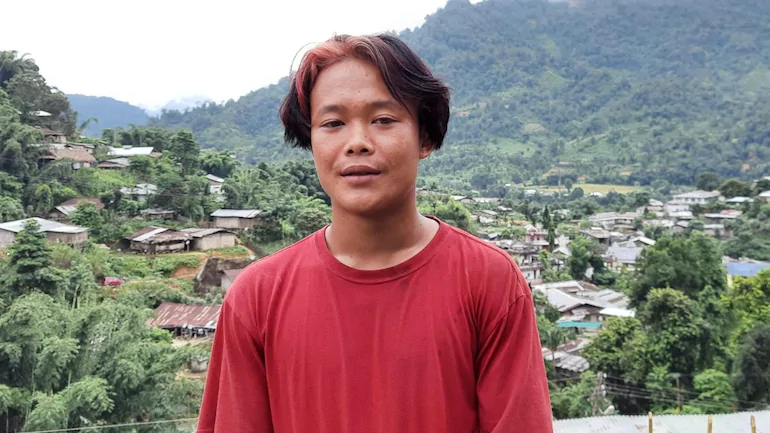
SOURCE: INDIA TODAY
Togley Singkam is 21 and earns his livelihood in the Upper Subansiri district of Arunachal Pradesh working as a porter. He is a resident of Taksing area that lies along the India-China border. Owing his superior knowledge of the terrain, he occasionally assists the government and military authorities in ferrying essentials in this remote area which earns him some additional money.
His life took a turn on March 19 this year – months before India-China military faceoff began along the Line of Actual Control in Ladakh – as he was abducted by the Chinese People’s Liberation Army (PLA).
He was moving around the area when he was he was taken captive by the PLA troops, who had crossed the Line of Actual Control. Within seconds, Togley Singkam was forced to bend on knees, his hands tied to his neck and eyes blindfolded.
He was released on April 7. Togley Singkam recounted his horrible experience of being a prisoner of the PLA while speaking to India Today TV.
AS CHINA’S CAPTIVE
“I was in Indian territory on 19th March. I go in that area regularly for hunting to get food and we eat that. That was when the PLA officials came and whisked me away. I could not run away because they were in huge numbers.”
“They made me sit on the floor, tied my hands at the back with the neck, wrapped my face and took me away. When my eyes opened then I was in a Chinese camp. I was then tied to a bed and beaten up. I was taken in another vehicle to some other place. My face was covered and I was beaten up again,” Togley Singkam told India Today TV.
Togley was taken into Chinese vehicle into their territory. When he opened his eyes he found himself sitting in a wooden chair in a stark dark room. He was subjected to kicking, slapping and electric shocks by the PLA abductors.
“I was kept in a dark room for entire 15 days. I was not allowed to close my eyes. Slapping, beating, shocks…everything was there,” he recounted.
“For 15 days, I was made to sit in a chair and not allowed to close my eyes for even fraction of a second. My condition was so bad that I could not tell daytime from night. I was given electric shocks and forced to confess that I am a spy of the Indian Army. They used to beat me randomly,” he said.
The torture did not end here.
“I was given packaged food and only allowed to get up for using toilet. My hands were clipped to the chair all the time. No one can sit without closing eyes for such long time. But they gave me electric shocks if I did. But, I did not give up even after that,” he said.
There are boards along the India-China border which are put up at certain strategic locations to identify the Indian territory to keep locals safe and secure in the boundary.
This has irked the People’s Liberation Army of China which even tried matching his handwriting with pictures of these boards in order to gather “prove” that Togley Singkam was a part of the intelligence system of India.
“They did my handwriting test also. I was given sheets to write because they wanted to ensure if I was the one writing along the border and putting up boards at some places. This was to check during patrolling if I was the one who had written India in the newly put up boards. This was a handwriting test and they made me write India on sheets of paper…but my hand writings did not match with any of the boards they compared,” Togley Singkam said.
LANGUAGE BARRIER ACROSS BORDER
But how did they interact with him, an Indian who does not know Mandarin?
Togley Singkam said he is not educated enough to write a few sentences in Hindi, a language he can speak. He cannot communicate in English. The Chinese have other limitations.
“The Chinese Army used mobile phones to record what I said and then to translate the same into their own language, and vice versa. Their language was translated into Hindi for me and played on the phone,” he said.
He said the Chinese asked him to use mobile phone, which he purposefully did not. “They asked me to use mobile phones. But I knew it was trap, so I tried to stay away from using them,” he said.
Being a local resident of Taksing, Togley Singkam has grown up watching army movements in the area but he had no clue what he should do if captured by an enemy force.
“They only wanted to me to accept that I was working for the Indian Army, clicking photo of the area and revealing secret locations. I told them that I had come to the forest for hunting and I was caught unaware by the Army,” Togley Singkam maintained.
IN FREE MAN’S WORLD AGAIN
After his release in April, he heaved sigh of relief and expressed his gratitude to authorities for ensuring his safe comeback to India. He said, “They released me because of the intervention by the Indian Army. They played a crucial role in this.”
“The central government took up my case and sent my Aadhaar card details to them. That is when I realised that I would continue to stay alive. I had given up by this time. The Chinese officials repeatedly told me that I would be punished in their country by their government. I am thankful that I have been saved and am back alive home,” he said.
Togley Singkam puts the life in unfriendly border area in perspective saying, “The Chinese Army usually harasses people in the border areas. They take people into custody on false allegations. They enter into our territory but are given a befitting reply by the India Army.”






